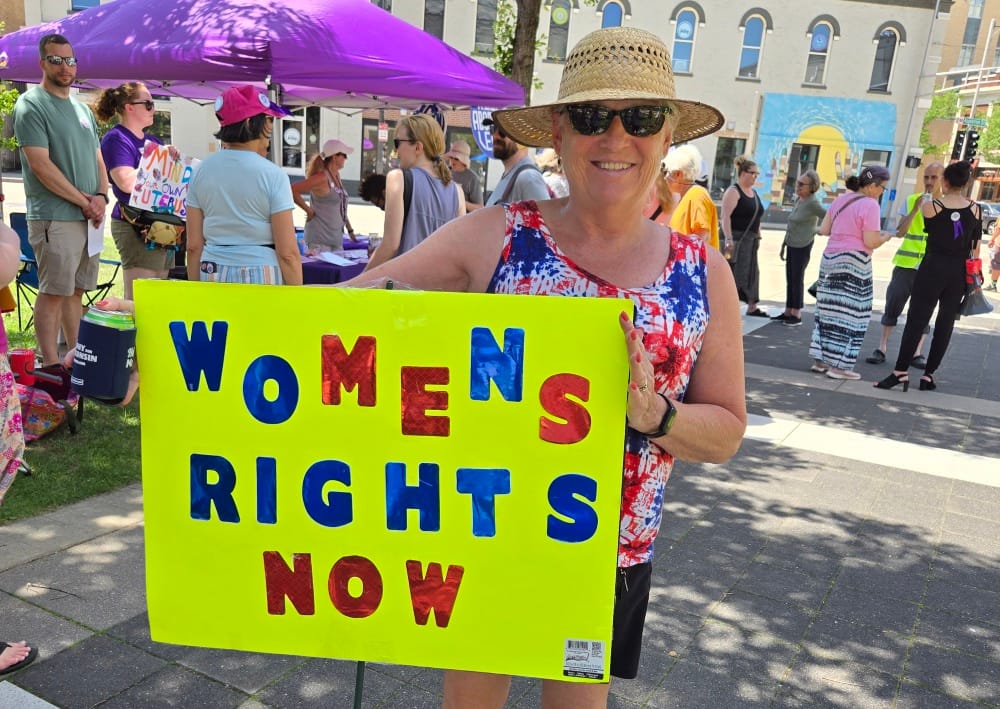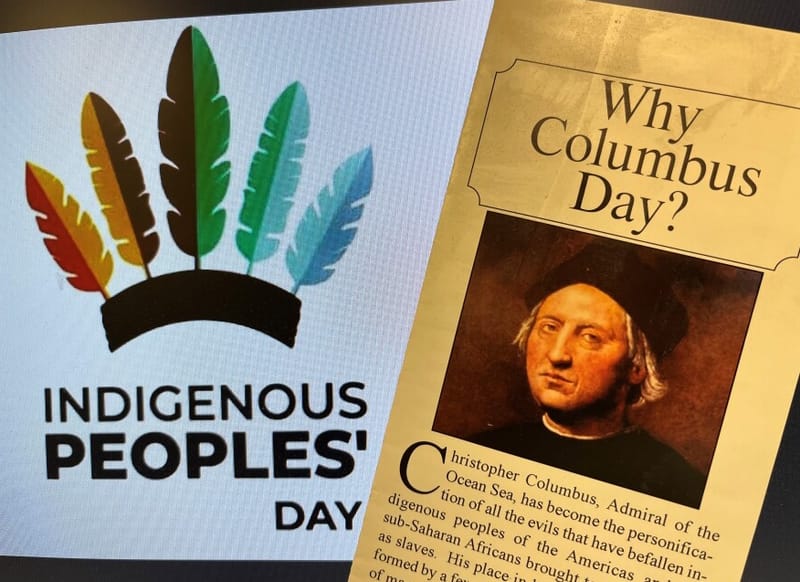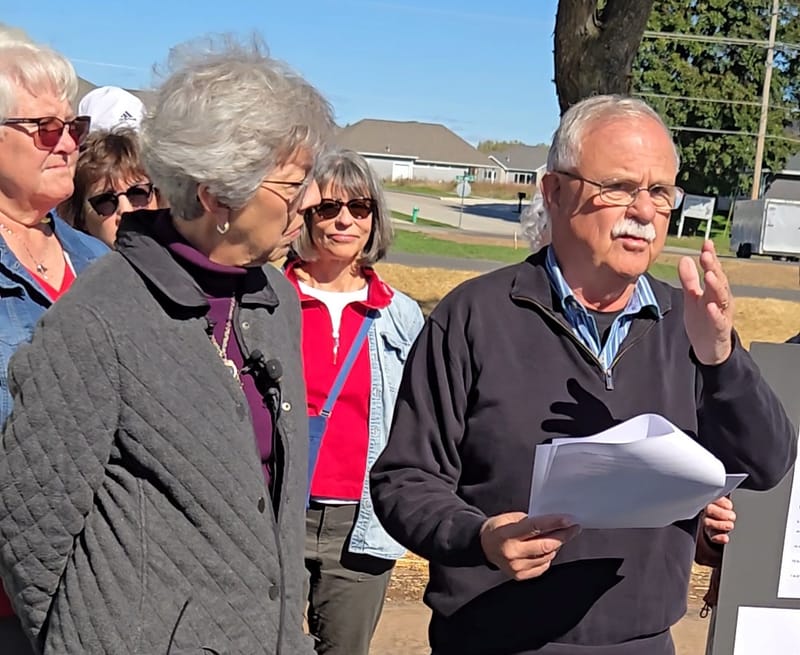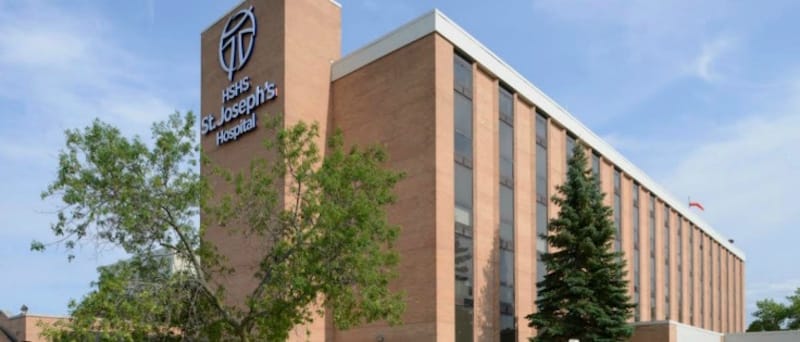Rally protesting Dobbs turns out 80 despite extreme heat
Women living in states with abortion bans are estimated to be at nearly twice the risk of dying during pregnancy, childbirth, or shortly after birth compared to women in states where abortion is legal.

Appleton Area NOW (National Organization of Women), Hate Free Outagamie, and the Democratic Party of Outagamie County sponsored a rally at Houdini Plaza on June 22 to protest the Dobbs decision that put women’s lives and rights at risk.
Irene Strohbeen, president of the Appleton Area NOW chapter, addressed the Reclaim Roe Now: A Rally for Reproductive Rights crowd of around 80 people in the 95-degree temperature.
“Who’s hot out there?” she asked. “It’s not just the weather. We are hot about the illegal bombing of Iran. We are hot about the power grabs and tax cuts for billionaires. We are hot about Project 2025, moving us closer and closer to authoritarianism. It is not a good time. But in the meantime, the war on women continues.”
The third anniversary of the U.S. Supreme Court's decision in Dobbs v. Jackson Women's Health Organization is June 24.




Strohbeen shared the tragic stories of women who lost their lives unnecessarily because they could not access the reproductive care they needed.
Women living in states with abortion bans are estimated to be at nearly twice the risk of dying during pregnancy, childbirth, or shortly after birth compared to women in states where abortion is legal. Some states, such as Louisiana, have seen risks three times as high. Texas, which enacted an abortion ban before the Dobbs decision, saw its maternal mortality rate rise by 56 percent in the first full year of its ban (2022), and then 33 percent overall post-ban in 2023.
Melissa Miotke, the original organizer of the 2017 Women’s March, shared her personal story about complications with a pregnancy that required her to leave the state to access the health care she needed.
“Without access to abortion two of the people I love most in the world would never have been born,” she said. “And I might not be here to tell the story. My dream of four babies came true because I had access to abortion. It protected my health, preserved my fertility, and gave me a chance to try again.
“Abortion bans are not pro-life. If we truly cared about saving lives, we would trust doctors to do their jobs. And, we would trust women to make decisions about their own bodies.
The Dobbs decision overturned Roe v. Wade (1973) which had established a constitutional right to abortion based on the right to privacy under the Fourteenth Amendment. The Dobbs decision, written by Justice Samuel Alito, held that the U.S. Constitution does not confer a right to abortion. By eliminating the federal constitutional right, the Dobbs decision returned the authority to regulate or ban abortion to individual states. Each state now decides its own laws regarding abortion access.
Wisconsin's right to an abortion has been a highly contested and evolving issue since the Dobbs decision. Due to the uncertainty surrounding an 1849 state law that criminalized abortion, abortion services largely ceased in Wisconsin. In the fall of 2023, there was a significant ruling by a Dane County circuit court judge who interpreted the 1849 law as prohibiting "feticide" (the killing of an unborn child against the will of the pregnant person), rather than consensual abortions. This ruling provided legal clarity, allowing clinics to reopen.
As of now, abortion is legally available in Wisconsin up to 22 weeks gestation (20 weeks post-fertilization). However, this is not a settled matter. The Dane County judge's ruling is currently being appealed to the Wisconsin Supreme Court. The interpretation of the 1849 law, and whether the state constitution provides an independent right to abortion, are key questions the Wisconsin Supreme Court is considering.
One of the two abortion cases before the Wisconsin Supreme Court has already had oral arguments. With the court's term ending soon, a decision on the core question of the 1849 law's meaning is anticipated in the coming weeks, likely before the end of July.
Dr. Ann Igler reminded the crowd to stay involved.
“Make yourself visible and heard,” she urged. “We have important things coming up. We have another state Supreme Court election in April. And, right now, there is a provision in the U.S. Budget Bill that prevents Medicaid from paying Planned Parenthood.”
If that provision passes, it would likely result in many clinics closing, even in states that do not have abortion limits.






